|
Books Should Be Free Loyal Books Free Public Domain Audiobooks & eBook Downloads |
|
|
Books Should Be Free Loyal Books Free Public Domain Audiobooks & eBook Downloads |
|
Science |
|---|
|
Book type:
Sort by:
View by:
|
By: C. G. (Curtis Gates) Lloyd (1859-1926) | |
|---|---|
 Synopsis of Some Genera of the Large Pyrenomycetes Camillea, Thamnomyces, Engleromyces
Synopsis of Some Genera of the Large Pyrenomycetes Camillea, Thamnomyces, Engleromyces
| |
By: John Claridge | |
|---|---|
 The Shepherd of Banbury's Rules to Judge of the Changes of the Weather, Grounded on Forty Years' Experience
The Shepherd of Banbury's Rules to Judge of the Changes of the Weather, Grounded on Forty Years' Experience
| |
By: Jasper W. Rogers | |
|---|---|
 Facts for the Kind-Hearted of England! As to the Wretchedness of the Irish Peasantry, and the Means for their Regeneration
Facts for the Kind-Hearted of England! As to the Wretchedness of the Irish Peasantry, and the Means for their Regeneration
| |
By: Thomas P. Bonczar | |
|---|---|
 Prevalence of Imprisonment in the U.S. Population, 1974-2001
Prevalence of Imprisonment in the U.S. Population, 1974-2001
| |
By: Samuel Christian Schmucker (1860-) | |
|---|---|
 The Meaning of Evolution
The Meaning of Evolution
| |
By: Henry Faudel | |
|---|---|
 Suggestions to the Jews for improvement in reference to their charities, education, and general government
Suggestions to the Jews for improvement in reference to their charities, education, and general government
| |
By: Lane Cooper | |
|---|---|
 Louis Agassiz as a Teacher; illustrative extracts on his method of instruction
Louis Agassiz as a Teacher; illustrative extracts on his method of instruction
| |
By: Henry Edward Crampton (1875-) | |
|---|---|
 The Doctrine of Evolution Its Basis and Its Scope
The Doctrine of Evolution Its Basis and Its Scope
| |
By: William Radcliff Birt (1804-1881) | |
|---|---|
 The Hurricane Guide Being An Attempt To Connect The Rotary Gale Or Revolving Storm With Atmospheric Waves.
The Hurricane Guide Being An Attempt To Connect The Rotary Gale Or Revolving Storm With Atmospheric Waves.
| |
By: Marjory MacMurchy Willison (-1938) | |
|---|---|
 The Canadian Girl at Work A Book of Vocational Guidance
The Canadian Girl at Work A Book of Vocational Guidance
| |
By: James H. Rawlinson | |
|---|---|
 Through St. Dunstan's to Light
Through St. Dunstan's to Light
| |
By: John Codman (1814-1900) | |
|---|---|
 Free Ships: The Restoration of the American Carrying Trade
Free Ships: The Restoration of the American Carrying Trade
| |
By: Robert Charles Hope (1855-1926) | |
|---|---|
 The Leper in England: with some account of English lazar-houses
The Leper in England: with some account of English lazar-houses
| |
By: Hosea Quinby (1804-1878) | |
|---|---|
 The Prison Chaplaincy, And Its Experiences
The Prison Chaplaincy, And Its Experiences
| |
By: Harry Best (1880-) | |
|---|---|
 The Deaf Their Position in Society and the Provision for Their Education in the United States
The Deaf Their Position in Society and the Provision for Their Education in the United States
| |
By: John Higginbottom (1788-1876) | |
|---|---|
 An Essay on the Application of the Lunar Caustic in the Cure of Certain Wounds and Ulcers
An Essay on the Application of the Lunar Caustic in the Cure of Certain Wounds and Ulcers
| |
By: Robert Carmichael-Smyth | |
|---|---|
 A Letter from Major Robert Carmichael-Smyth to His Friend, the Author of 'The Clockmaker'
A Letter from Major Robert Carmichael-Smyth to His Friend, the Author of 'The Clockmaker'
| |
By: William Hunter (1718-1783) | |
|---|---|
 On the uncertainty of the signs of murder in the case of bastard children
On the uncertainty of the signs of murder in the case of bastard children
| |
By: William Taylor Marrs | |
|---|---|
 Confessions of a Neurasthenic
Confessions of a Neurasthenic
| |
By: Edmund Deane (1582?-1640) | |
|---|---|
 Spadacrene Anglica The English Spa Fountain
Spadacrene Anglica The English Spa Fountain
| |
By: J. J. [Editor] Cranmer | |
|---|---|
 Vanity, All Is Vanity A Lecture on Tobacco and its effects
Vanity, All Is Vanity A Lecture on Tobacco and its effects
| |
By: Rossiter W. (Rossiter Worthington) Raymond (1840-1918) | |
|---|---|
 Peter Cooper The Riverside Biographical Series, Number 4
Peter Cooper The Riverside Biographical Series, Number 4
| |
By: Archibald Makellar | |
|---|---|
 An Investigation into the Nature of Black Phthisis or Ulceration Induced by Carbonaceous Accumulation in the Lungs of Coal Miners
An Investigation into the Nature of Black Phthisis or Ulceration Induced by Carbonaceous Accumulation in the Lungs of Coal Miners
| |
By: Orin Fowler (1791-1852) | |
|---|---|
 A Disquisition on the Evils of Using Tobacco and the Necessity of Immediate and Entire Reformation
A Disquisition on the Evils of Using Tobacco and the Necessity of Immediate and Entire Reformation
| |
By: C. J. (Charles John) Cornish (1858-1906) | |
|---|---|
 The Naturalist on the Thames
The Naturalist on the Thames
| |
By: Joseph Bradford Cox (1840-) | |
|---|---|
 Report on Surgery to the Santa Clara County Medical Society
Report on Surgery to the Santa Clara County Medical Society
| |
By: H. Gordon Montague | |
|---|---|
 Two New Pocket Gophers from Wyoming and Colorado
Two New Pocket Gophers from Wyoming and Colorado
| |
By: Donald W. Janes | |
|---|---|
 Home Range and Movements of the Eastern Cottontail in Kansas
Home Range and Movements of the Eastern Cottontail in Kansas
| |
By: England) Knaresbrough Rail-Way Committee (Knaresborough | |
|---|---|
 Report of the Knaresbrough Rail-way Committee
Report of the Knaresbrough Rail-way Committee
| |
By: William B. Jackson | |
|---|---|
 Seventeen Species of Bats Recorded from Barro Colorado Island, Panama Canal Zone
Seventeen Species of Bats Recorded from Barro Colorado Island, Panama Canal Zone
| |
By: Various | |
|---|---|
 Short Nonfiction Collection
Short Nonfiction Collection
A collection of ten short essays or other short nonfiction works in the public domain. | |
By: J.G. M'Pherson (1845-?) | |
|---|---|
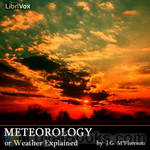 Meteorology; or Weather Explained
Meteorology; or Weather Explained
Weather Explained: Fog, clouds, rain, haze, thunder, cyclones, dew point and how to count dust motes are just a few of the 35 topics covered in short, easy to read and understand chapters in this book published in 1905. | |
By: Unknown | |
|---|---|
 The Good Housekeeping Marriage Book
The Good Housekeeping Marriage Book
A collection of articles from Good Housekeeping magazine, The Good Housekeeping Marriage Book focuses on the subject of marriage. With instructions and advice from courtship to raising children, this collection aims to assist those with questions and concerns surrounding marriage and the ensuing relationship. Published in 1938. | |
By: Anonymous | |
|---|---|
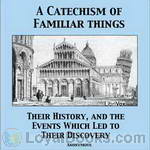 A Catechism of Familiar Things; Their History, and the Events Which Led to Their Discovery
A Catechism of Familiar Things; Their History, and the Events Which Led to Their Discovery
This book, a reprint of a successful English publication, has been so enlarged as to be to all intents and purposes new. It has been carefully revised by a Reverend gentleman, who for some time filled the chair of Physics and Chemistry in one of our colleges. Recent inventions and improvements are described in a simple, popular style, so as to be easily understood by all, and short notices are given of prominent inventors and scientists. The paragraphs relating to doctrinal matters conform in every respect to the teachings of the Church... | |
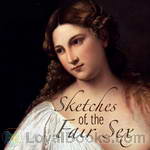 Sketches Of The Fair Sex
Sketches Of The Fair Sex
Sketches of the fair sex, in all parts of the world. To which are added rules for determining the precise figure, the degree of beauty, the habits, and the age of women, notwithstanding the aids and disguise of dress. It is our design to present a pleasing and interesting miscellany, which will serve to beguile the leisure hour, and will at the same time couple instruction with amusement. We have used but little method in the arrangement: Choosing rather to furnish the reader with a rich profusion... | |
By: Unknown | |
|---|---|
 Prime Numbers
Prime Numbers
A recording of the first 2000 prime numbers (2-17389). Recommended listening for math fanatics and insomniacs! | |
By: Sigmund Freud (1856-1939) | |
|---|---|
 Psychopathology of Everyday Life
Psychopathology of Everyday Life
Professor Freud developed his system of psychoanalysis while studying the so-called borderline cases of mental diseases, such as hysteria and compulsion neurosis. By discarding the old methods of treatment and strictly applying himself to a study of the patient's life he discovered that the hitherto puzzling symptoms had a definite meaning, and that there was nothing arbitrary in any morbid manifestation. Psychoanalysis always showed that they referred to some definite problem or conflict of the person concerned... | |
By: Aristotle (384 BC - 322 BC) | |
|---|---|
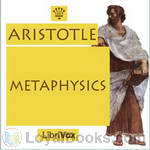 Metaphysics
Metaphysics
Metaphysics is essentially a reconciliation of Plato’s theory of Forms that Aristotle acquired at the Academy in Athens, with the view of the world given by common sense and the observations of the natural sciences. According to Plato, the real nature of things is eternal and unchangeable. However, the world we observe around us is constantly and perpetually changing. Aristotle’s genius was to reconcile these two apparently contradictory views of the world. The result is a synthesis of the naturalism of empirical science, and the mysticism of Plato, that informed the Western intellectual tradition for more than two thousand years... | |
By: Harry Harrison (1925-) | |
|---|---|
 The Misplaced Battleship
The Misplaced Battleship
"It might seem a little careless to lose track of something as big as a battleship ... but interstellar space is on a different scale of magnitude. But a misplaced battleship—in the wrong hands!—can be most dangerous." The world class con man and thief known as the Stainless Steel Rat (diGriz) has another very big problem to solve and this science fiction novella by the great Harry Harrison will see if he can solve it and perhaps four or five more like it before this fascinating and funny tale is finished. 'Use a thief to catch a thief' sounds great but it sometimes has unexpected results. | |
By: H. Beam Piper (1904-1964) | |
|---|---|
 A Slave is A Slave
A Slave is A Slave
The Galactic Empire is slowly 'welcoming' into the family of civilized worlds those systems so far off in the backwater of the galaxy that they have been overlooked and ignored for the past 500 years or so. This is purely routine work because every planet offered the chance has eagerly accepted the invitation. Mainly because the enlightened Empire lets the planetary government continue to rule and do whatever it wants...with a few minor restrictions of course; and because the they are shown what happens to planets who decide not to accept the invitation... | |
By: Herbert J. Hall (1870-1923) | |
|---|---|
 The Untroubled Mind
The Untroubled Mind
A very wise physician has said that “every illness has two parts—what it is, and what the patient thinks about it.” What the patient thinks about it is often more important and more troublesome than the real disease. What the patient thinks of life, what life means to him is also of great importance and may be the bar that shuts out all real health and happiness. The following pages are devoted to certain ideals of life which I would like to give to my patients, the long-time patients who have especially fallen to my lot. | |
By: Harry Harrison (1925 -) | |
|---|---|
 The K-Factor
The K-Factor
The human race has reached the stars, colonized many planets and done amazing things in all areas of scientific progress. But humans are still humans and remain both honorable and not so honorable; some with high ideals and others with very low ones indeed. So why hasn't war occurred in several centuries among the hundreds of planets? Has man really changed? Not on your life it hasn't! Read how science has given man peace but at what cost? | |
By: Anonymous | |
|---|---|
 My Secret Life, Volumes I. to III. 1888 Edition
My Secret Life, Volumes I. to III. 1888 Edition
| |
By: E.E. Smith (1890-1965) | |
|---|---|
 The Vortex Blaster
The Vortex Blaster
Uncontrolled, terribly violent Atomic Vortices are slowly destroying civilization on every human planet throughout the galaxy. Nothing can contain or stop them despite the lensmen's best efforts until one destroys the home and family of "Storm" Cloud, brilliant atomic physicist. The tragedy triggers actions on his part that pit him one-on-one against the horrible vortices. Introducing "storm" Cloud as THE Vortex Blaster | |
By: Harry Harrison (1925-2012) | |
|---|---|
 The Repairman
The Repairman
This is a collection of 3 of Harry Harrison marvelous early stories that were published in Galaxy, Analog and Fantastic Universe. The Repairman (1958) is a straight fun SF story of a man getting a job done. It is most typical of his later style in series like the Stainless Steel Rat; Toy Shop (1962), a short piece exploring bureaucratic blindness and one ingenious way around it and The Velvet Glove (1956), my favorite for its writing style, fun perspective, sly social commentary on the scene in 1956 and just plain delightful imagination. And he manages to pack excitement and mystery in at the same time. | |
By: Ray Cummings (1887-1957) | |
|---|---|
 The World Beyond
The World Beyond
Lee Anthony finds himself and two of his friends kidnapped and taken on a strange voyage. | |
By: Aristotle (384-422) | |
|---|---|
 On the Heavens
On the Heavens
On the Heavens (Greek: Περί ουρανού, Latin: De Caelo or De Caelo et Mundo) is Aristotle's chief cosmological treatise. In it Aristotle argues that the Earth is a sphere by pointing to the evidence of lunar eclipses. Aristotle also provides a detailed explanation of his theory of 'gravity' arguing that things which contain 'earth' fall towards the centre of the Universe because 'earth' is naturally attracted to the centre of the Universe. Aristotle argues that if the planet Earth was moved to the location of the Moon then objects which contain 'earth' would not fall towards the centre of the Earth but rather towards the centre of the Universe... | |
By: Randall Garrett (1927-1987) | |
|---|---|
 A Spaceship Named McGuire
A Spaceship Named McGuire
Can a spaceship go crazy? Well, yes it can if it has a brain. And the new MG (magnetogravitic drive) experimental robot space ship does indeed have a 'brain'. Completely bewildered as to why the first six models of their supposedly perfect new ship model, the MG-YR, nicknamed the McGuire, have gone totally bonkers after activation and before they could ever be used, the company has called in the services of Daniel Oak. They suspect sabotage of course. Daniel Oak is the hard boiled private investigator with nerves of steel and a mind of the same substance... | |
By: Aristotle (384 BCE-322 BCE) | |
|---|---|
 On Generation and Corruption
On Generation and Corruption
On Generation and Corruption (Ancient Greek: Περὶ γενέσεως καὶ φθορᾶς, Latin: De Generatione et Corruptione, also known as On Coming to Be and Passing Away) is a treatise by Aristotle. Like many of his texts, it is both scientific and philosophic (although not necessarily scientific in the modern sense). The philosophy, though, is essentially empirical; as in all Aristotle's works, the deductions made about the unexperienced and unobservable are based on observations and real experiences... | |
By: Elisha Gray (1835-1901) | |
|---|---|
 Nature's Miracles Volume II: Energy and Vibration
Nature's Miracles Volume II: Energy and Vibration
Elisha Gray was an American electrical engineer who co-founded the Western Electric Manufacturing Company. Gray is best known for his development of a telephone prototype in 1876 in Highland Park, Illinois and is considered by some writers to be the true inventor of the variable resistance telephone, despite losing out to Alexander Graham Bell for the telephone patent.Nature’s Miracles: Familiar Talks on Science, published in 1900, is a discussion of science and technology for the general public. Volume II is subtitled Energy and Vibration: Energy, Sound, Heat, Light, Explosives. | |
By: Unknown (384 BC - 322 BC) | |
|---|---|
 Politics: A Treatise on Government
Politics: A Treatise on Government
| |
By: H. G. Wells (1866-1946) | |
|---|---|
 Anticipations
Anticipations
Wells considered this book one of his most important, a natural follow-up to such works as his Man of the Year Million and The Time Machine. His goal was to get people to think and act in new ways. The book starts with a look at how humans get along socially and how they carry out their business ventures. It then discusses how these elements influence others, such as politics, the world of work, and education. H. G. tried to make clear how the current social order was disintegrating without preparing another to take its place. He then traced the roots of democracy, which in its present state he saw as unworkable. Instead, he proposed a new republic. He also critiqued modern warfare. | |
By: John Cargill Brough (1834-1872) | |
|---|---|
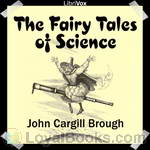 The Fairy Tales of Science
The Fairy Tales of Science
This book, written in the mid 19th century and illustrated by Charles H. Bennett, provides an entertaining introduction to topics in science for children. In each chapter, the author uses a popular myth or fairy tale to lay the groundwork for an equally fascinating "fairy tale of science" full of interesting facts and real life examples. | |
By: Various | |
|---|---|
 National Geographic Magazine Vol. 01 No. 1.
National Geographic Magazine Vol. 01 No. 1.
National Geographic Magazine Volume 1 Number 1 published in 1889. Topics of articles are:Announcement by the National Geographic SocietyIntroductory Address by the PresidentGeographic Methods in Geologic InvestigationClassification of Geographic Forms by GenesisThe Great Storm of March 11 to 14, 1888The Great Storm off the Atlantic Coast of the United States, March 11th to 14th, 1888The Survey of the CoastThe Survey and Map of Massachusetts | |
By: Murray Leinster (1896-1975) | |
|---|---|
 The Ambulance Made Two Trips
The Ambulance Made Two Trips
Big Jake Connors is taking over his town through violence, inimidation and bribery but Detective Sergeant Fitzgerald can only grind his teeth in frustration. The gangsters seem to have everything going their way until the day that a little dry cleaning establishment declines their offer of 'protection' and strange things start to happen. Murray Leinster gives us another wonderful product of 'what if' from his limitless imagination to enjoy in this gem of a story. Listen and smile. | |
By: Aristotle (384 BCE-322 BCE) | |
|---|---|
 Parva Naturalia
Parva Naturalia
Parva Naturalia [the "short treatises on nature" (a conventional Latin title first used by Giles of Rome)] is a collection of books by Aristotle, which discuss natural phenomena involving the body and the soul. The books are as follows:I - On Sensation and the SensibleII - On Memory and RecollectionIII - On Sleeping and WakingIV - On DreamsV - On Prophecy in SleepVI - On Longevity and Shortness of LifeVII - On Youth and Old Age, Life and Death VIII - On Respiration | |
By: John Phin (1830-1913) | |
|---|---|
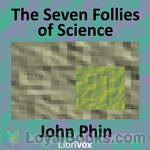 The Seven Follies of Science
The Seven Follies of Science
The seven follies of science; a popular account of the most famous scientific impossibilities and the attempts which have been made to solve them to which is added a small budget of interesting paradoxes, illusions, and marvels. | |
By: Charles Godfrey Leland (1824-1903) (1824-1903) | |
|---|---|
 The Mystic Will
The Mystic Will
This book presents a method of developing and strengthening the faculties of the mind, through the awakened will, by a simple, scientific process possible to any person of ordinary intelligence | |
By: Gaston Maspero (1846-1916) | |
|---|---|
 Manual of Egyptian Archaeology and Guide to the Study of Antiquities in Egypt
Manual of Egyptian Archaeology and Guide to the Study of Antiquities in Egypt
A handbook of Egyptian archaeology, issued by the British Museum, considered suitable for British tourists travelling to Egypt in the 19th Century. (Introduction by Timothy Ferguson) | |
By: J. Arthur Thomson (1861-1933) | |
|---|---|
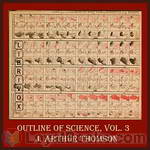 The Outline of Science Vol. 3
The Outline of Science Vol. 3
The Outline of Science was written specifically with the man-on-the-street in mind as the target audience. Covering scientific subjects ranging from astronomy to biology to elementary physics in clear, concise and easily understood prose, this popular science work is largely as relevant today as when first published in 1922.In this third volume (of four), we learn about psychic science, the characteristics and interrelations of living creatures, as well as Botany, Biology, and Chemistry. Some chapters are devoted to the new applied sciences of electricity, telegraphy, and flying. | |